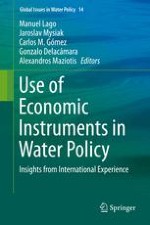
2015 | OriginalPaper | Buchkapitel
1. Defining and Assessing Economic Policy Instruments for Sustainable Water Management
verfasst von : Manuel Lago, Jaroslav Mysiak, Carlos M. Gómez, Gonzalo Delacámara, Alexandros Maziotis
Erschienen in: Use of Economic Instruments in Water Policy
Aktivieren Sie unsere intelligente Suche, um passende Fachinhalte oder Patente zu finden.
Wählen Sie Textabschnitte aus um mit Künstlicher Intelligenz passenden Patente zu finden. powered by
Markieren Sie Textabschnitte, um KI-gestützt weitere passende Inhalte zu finden. powered by